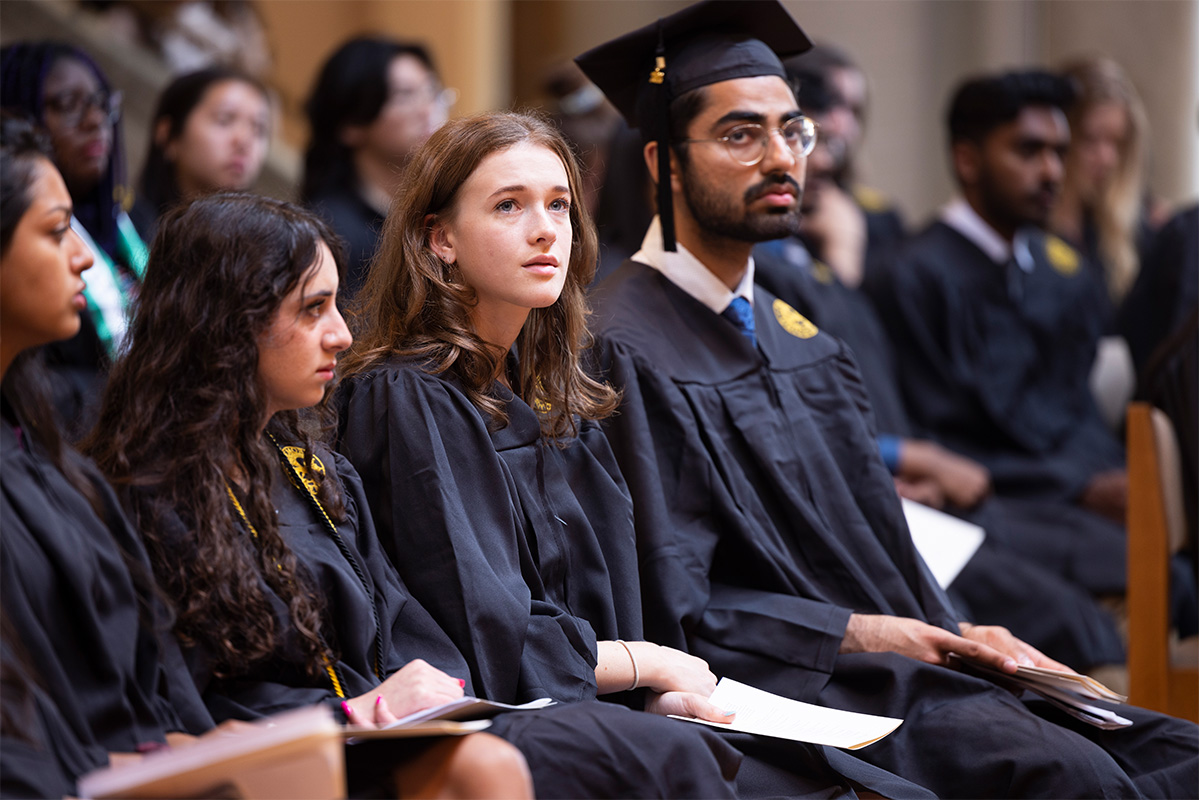Getting through college, especially during a pandemic, can test one’s belief in oneself and one’s purpose. At Emory’s first in-person Baccalaureate ceremony since 2019, graduating seniors shared how campus spiritual communities sustained them.
“I have struggled these last two semesters with a few personal things, and my faith wavered,” Riya Mehta, who earned degrees in neuroscience and quantitative sciences from Emory College of Arts and Sciences, told members of the class of 2022 gathered together in Cannon Chapel on the Friday afternoon before Commencement.
“I started to question myself in everything, which initially scared me, but ultimately helped me better understand myself. Having a solid community within the Hindu Students Association has reminded me of why I continue my spiritual journey,” Mehta said. “I consider myself incredibly fortunate to find myself in a vibrant and engaging community at Emory and specifically within the comfort of my fellow HSA members.”
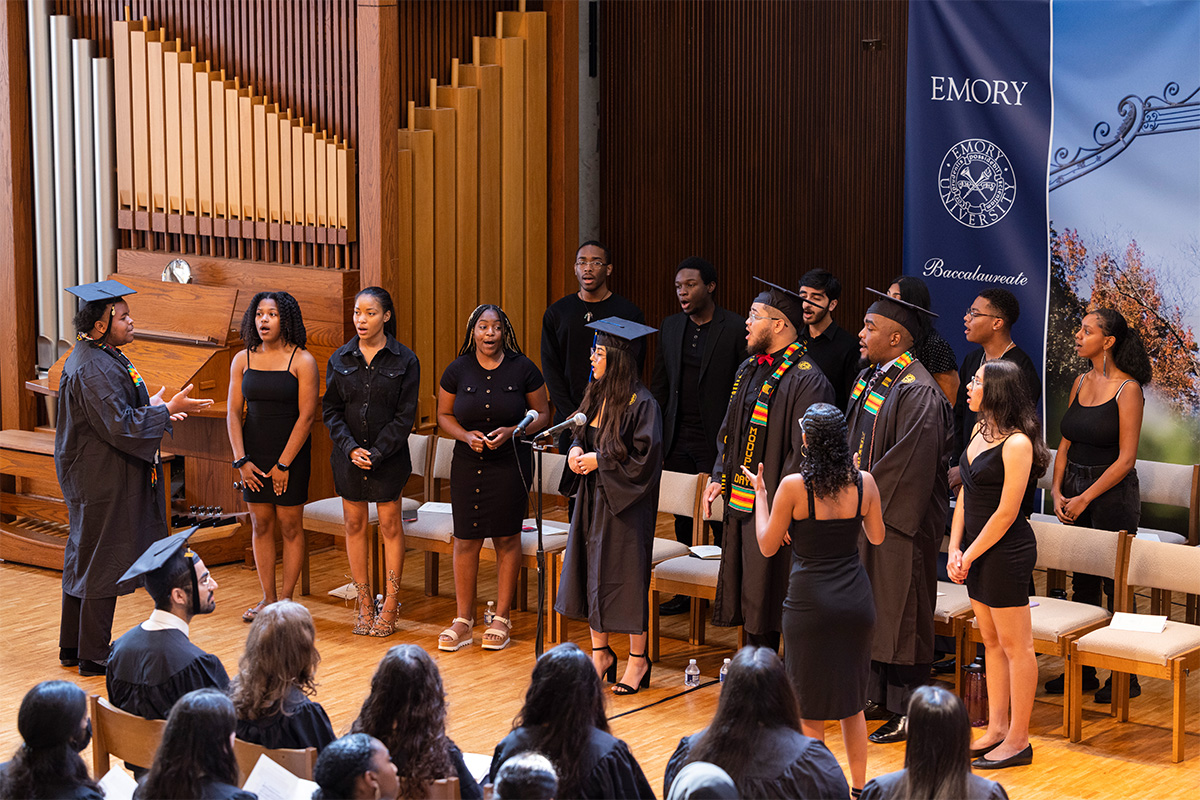
Emory College senior Matthew Nails (left) directed the AHANA a cappella ensemble.
Common ground
Weaving through the seniors’ reflections was a meditation in music offered by the AHANA a cappella ensemble. Directed by Matthew Nails, another graduating senior in Emory College, their voices invited students to reflect on the past, present and future while slideshows of the class engaging in spiritual and service activities played on the chapel’s screens.
Songs, including hits by John Legend and Beyoncé, highlighted the Baccalaureate themes of community, service and making change, culminating in “Glory,” the final selection. From the film “Selma,” its inspiring lyrics uplifted the ongoing work of racial and social justice that was also a defining aspect of the Class of 2022’s years at Emory.
Through both word and song, students’ diverse spiritual traditions reached common ground in the ceremony’s goal — to invite reflection, thanksgiving and celebration.
“Assalamu alaikum. May the peace of God, his graciousness and blessings be with you,” said Emory College senior Ahmed Aljohani, who credited the Muslim Students Association with teaching him that his most important lessons at Emory would happen outside the classroom. This inspired him to offer support to current and future Emory students as he became an alumnus.
“We implore you to reach out to us anytime you need help,” he said. “We will continue to make Emory a strong community and we all strive to see you become accomplished leaders.”
Noah Lee, another Emory College graduate, described how his Jewish faith, and the teachings of influential philosophers, helped him to make peace with the loneliness inherent in independent life.
“Lean into your ability to form constellations,” Lee advised the Baccalaureate congregation. “Bring about redemption in our world in the face of the pressures of society and capitalism. Make it a priority to stop. Pull the brakes on the rapidly moving vehicle of progress propelling you forward. Embrace each other and recognize the higher power that lies in togetherness.”
For Emory College graduate Pushkar Shinde, Emory’s humanist community helped him see that “the alignment of people, place and the pursuit of understanding is a spiritual act, and it need not end here,” he said. “My wish for us all is that our education, our persistent quest for an awakened life, reverberates through every moment of our lived experience.”
Through Emory’s interfaith gatherings, Naman Santdasani, a graduating senior in Goizueta Business School, explored the importance of ethics, integrity and compassion in his Hindu tradition and others.
“Emory, a microcosm of the world, proved to be the perfect place for me to dive into unexplored areas,” he said. “My experiences thus far have prompted me to ask questions, given me the courage to seek answers and find a sense of belonging wherever I go. I find myself thinking about what else I might learn on the spiritual journey and the people I will meet, and nothing could be more exciting.”
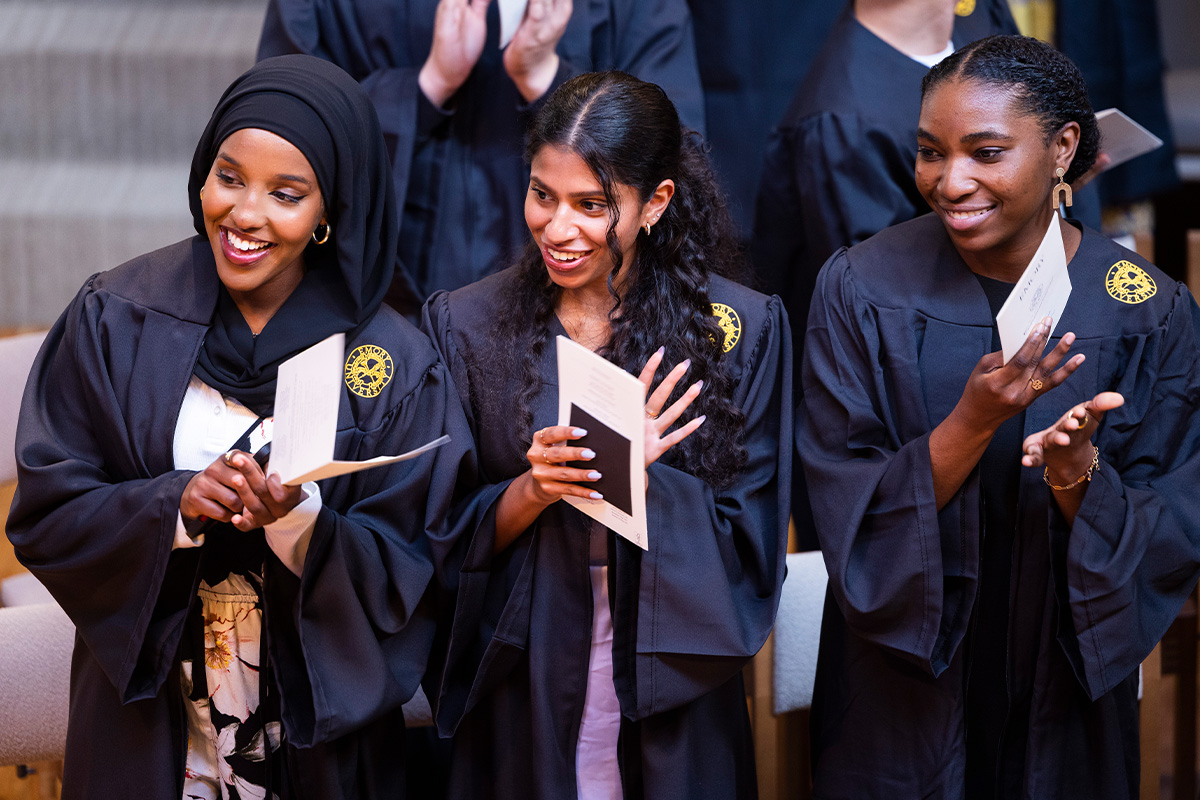
Baccalaureate offers an interfaith celebration of undergraduate students in the Class of 2022.
Faithful in small things
For Eliana Namen, a board member for the Catholic Student Union and senior in Emory College, pandemic isolation and despair “started to shake me, and my steady fortress of developed faith was tumbling down at my feet. I missed the feeling of belonging and community and felt alone.”
She found a “saving grace” in the compassion and generosity of Catholic communities at Emory and metro Atlanta. They demonstrated Mother Teresa’s words: “Be faithful in small things, because it is in them that your strength lies.” Adopting this mindset has made a huge difference for her.
“In performing small acts of kindness, in truly being present for my fellow peers and friends, in creating lasting relationships— these small things have become my everything,” she said.
She noted the bond between all types of faith and human resilience.
“Perseverance and adaptability have been two of the greatest characteristics of our world and especially our Emory community in these last few years,” she said. “We have had incredible courage and might to continue trudging forward despite all the obstacles the world has put before us, and I wish to recognize and applaud all of us for our efforts in making it to this very moment.”
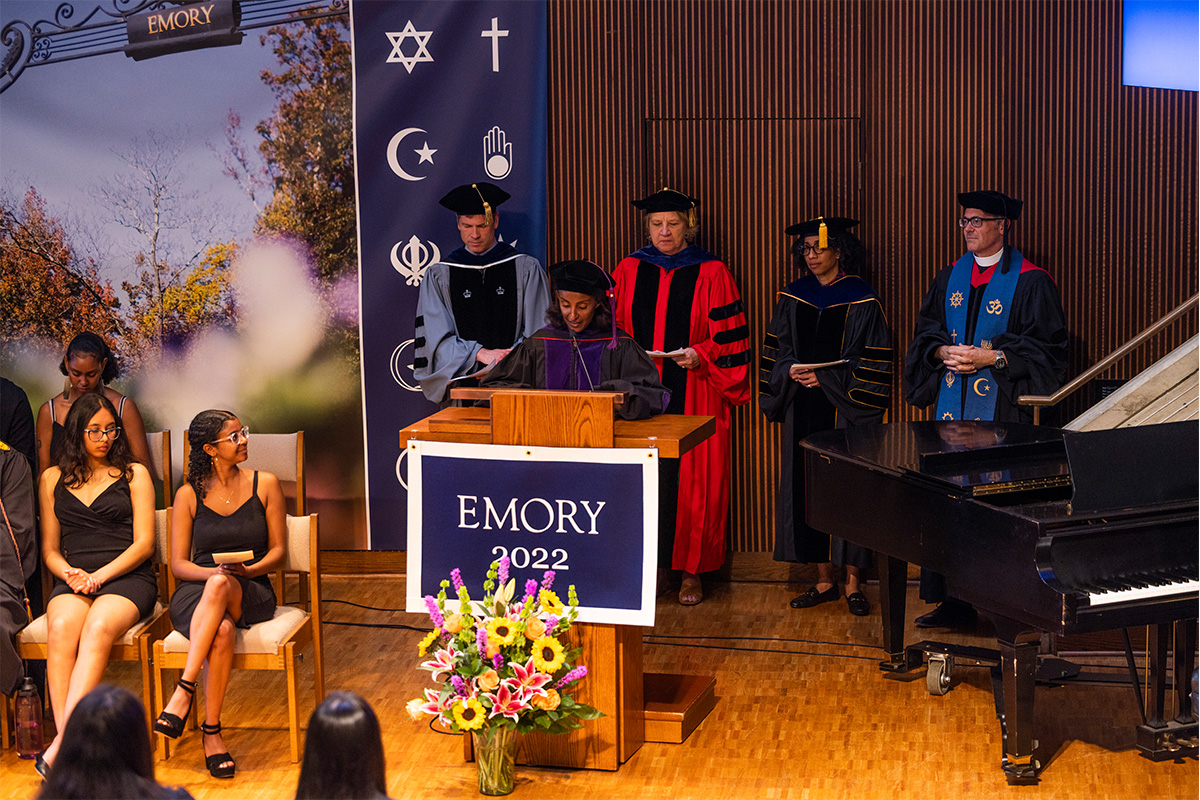
Enku Gelaye, senior vice president and dean of Campus Life, speaks to graduates. Behind her are (left to right) Michael A. Elliott, dean of Emory College; Linda A. McCauley, dean of Nell Hodgson Woodruff School of Nursing; Jill Perry-Smith, senior associate dean of Goizueta Business School; and Rev. Gregory W. McGonigle, Emory’s dean of religious life and university chaplain.
Benedictions from Emory leaders
Best wishes and blessings came from some of Emory’s key leaders as well.
Enku Gelaye, senior vice president and dean of Campus Life, offered the seniors hope for continued community, connection, friendship and love. Michael A. Elliott, dean of Emory College, described a wish that each graduate will have a passion for the earth, to relieve suffering and contribute to the healing and wellbeing of all.
Linda A. McCauley, dean of the Nell Hodgson Woodruff School of Nursing and also a graduate of the school, described the students’ potential to foster greater peace, justice, compassion and flourishing. And Jill Perry-Smith, senior associate dean of Goizueta Business School, voiced hope that the seniors would always grow in wisdom, heart and knowledge.
In connecting faith to creativity and risk-taking, Emory President Gregory L. Fenves also invoked a famously strong woman, whose music was featured in the ceremony.
“Creativity starts with taking a leap of faith, telling your fears they are not allowed where you are headed,” he said, quoting Beyoncé. “That means believing in yourself, in your instincts, and recognizing that the only failure is that of inaction, of not trying, of not seeking a path because you are unsure. You will always be unsure, but you should still seek that path."
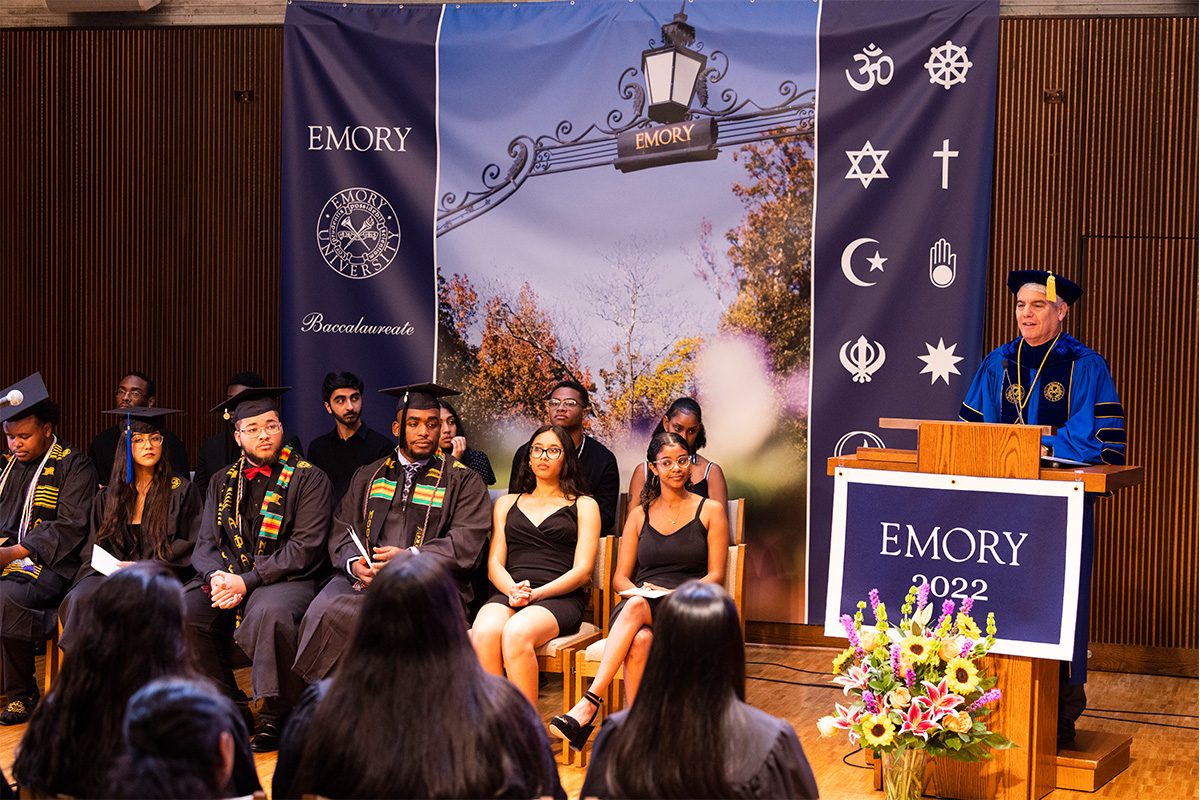
Emory President Gregory L. Fenves encouraged graduates to believe in themselves and embrace creativity, even when they feel uncertain.
Marking loss, going forth
The Baccalaureate service also offered silence, meditation and prayer to mark the losses of Emory community members and students’ family members, especially during the pandemic.
“We know their time with us was too short, and we hold our memories close and cherish the gifts they brought to Emory and the world through their lives,” said Maddie Henderson, Emory’s Christian chaplain.
Five graduating seniors offered brief invocations from their faith traditions: Parul Sharma (Hinduism), Meha Srivastava (Buddhism), Eden Medina (Judaism), Grace Gerenday (Christianity) and Sultan Minhas (Islam). All were graduating from Emory College.
Emory chaplains and faith leaders shared their insights as well.
“Spring is a time of transition; it is in process, it is in progress and most importantly, it marks a desire to grow,” noted Hindu Chaplain Brahmacharini Shweta Chaitanya. “We can't say for sure what path the vines will take. We don't know in what direction the breeze will carry the fragrance of the flowers. But we know that when spring arrives, everything is set in motion and the movement continues to collectively shape and guide nature into its next phase.”
Muslim Religious Life Scholar Isam Vaid — himself a graduate of Oxford College, Emory College and Rollins School of Public Health — offered a prayer from the Holy Quran: “Cause me to enter upon whatever I may do in a manner true and sincere and cause me to leave it in a manner true and sincere.”
In a keepsake that symbolized the connections between the students, their beliefs and Emory, each senior at the Baccalaureate received a magnet with symbols of the religious, spiritual and wisdom traditions practiced at Emory, “including the Muscogee knot, which is a representation of the first people to live and to learn in this place,” said the Rev. Gregory W. McGonigle, Emory’s dean of religious life and university chaplain. “We hope you take it with you as a reminder of all the blessings that are wished for you, now and always.”
